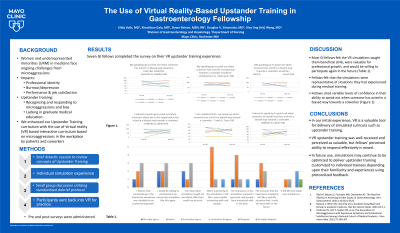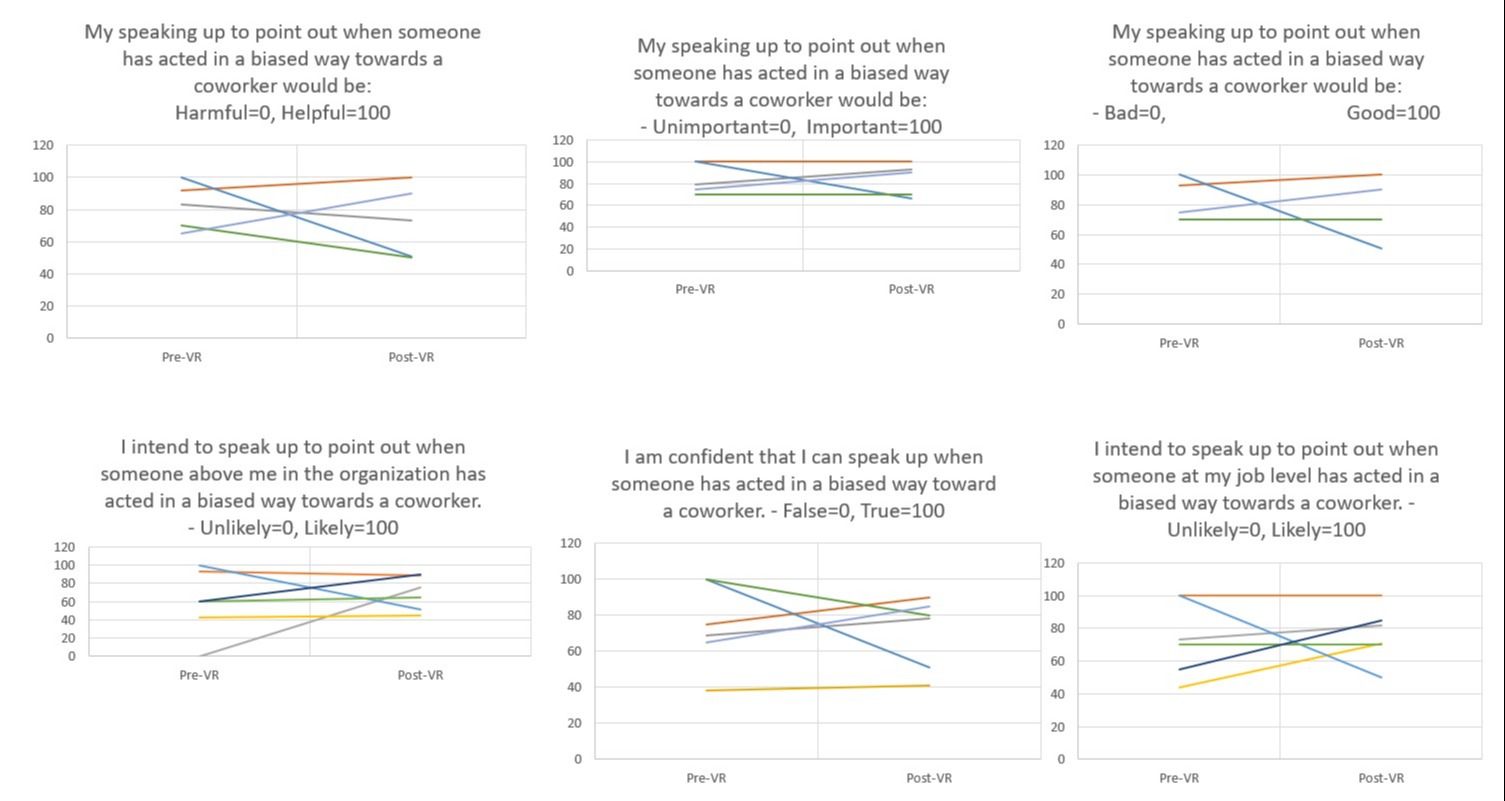Tuesday Poster Session
Category: Practice Management
P4899 - The Use of Virtual Reality (VR) Based Upstander Training in Gastroenterology Fellowship
Tuesday, October 29, 2024
10:30 AM - 4:00 PM ET
Location: Exhibit Hall E

- EV
Elida Voth, MD
Mayo Clinic
Rochester, MN
Presenting Author(s)
Xiao Jing (Iris) Wang, MD1, Elida Voth, MD1, Khushboo Gala, MBBS2, Dawn E.. Nelson, MSN, RN1, Douglas Simonetto, MD1
1Mayo Clinic, Rochester, MN; 2Mayo Clinic School of Graduate Medical Education, Rochester, MN
Introduction: Women and underrepresented minorities still face frequent microaggressions despite increased awareness of the importance of diversity and inclusion in medicine. Upstander training- how to recognize and respond to microaggressions - is underutilized in graduate medical education. We enhanced our Upstander Training curriculum in our gastroenterology (GI) fellowship with the use of virtual reality (VR) simulations.
Methods: Physician trainees (gastroenterology fellows) took part in a VR-based interactive curriculum for upstander training, with two simulations based upon microaggressions in the workplace initiated by patients and coworkers. Prior to simulation, a brief didactic session was held to establish baseline knowledge on upstander training and encourage open mindset. After each simulation session, small group discussion was held utilizing a standardized debrief protocol. Participants completed a pre- and post- survey on their experience and how sessions impacted their personal and professional growth (Likert scale).
Results: Seven GI fellows completed the survey on their VR upstander training experience. The majority of fellows felt that the simulations taught them beneficial skills, that it was valuable for their professional growth, and they would be willing to participate in a simulation like this again in the future (Table 1). Participants felt somewhat that they were interacting with real people during the simulation, and the characters were representative of situations they had experienced during medical training. Most fellows shared that they intend to speak out when someone makes bias statements against a coworker; however, despite completing upstander training, fellows cited variable levels of confidence in their ability to speak out when someone has acted in a biased way towards a coworker (Figure 1).
Discussion: In our initial experience, VR is a valuable tool for delivery of simulated curricula such as upstander training. VR upstander training was well-received and perceived as valuable, but despite this, fellows’ perceived confidence in their ability to respond effectively is mixed. In future use, the simulations may continue to be optimized to deliver upstander training with protocolized feedback that can be customized to individual trainees depending on their familiarity with and experience of microaggressions.

Note: The table for this abstract can be viewed in the ePoster Gallery section of the ACG 2024 ePoster Site or in The American Journal of Gastroenterology's abstract supplement issue, both of which will be available starting October 27, 2024.
Disclosures:
Xiao Jing (Iris) Wang, MD1, Elida Voth, MD1, Khushboo Gala, MBBS2, Dawn E.. Nelson, MSN, RN1, Douglas Simonetto, MD1. P4899 - The Use of Virtual Reality (VR) Based Upstander Training in Gastroenterology Fellowship, ACG 2024 Annual Scientific Meeting Abstracts. Philadelphia, PA: American College of Gastroenterology.
1Mayo Clinic, Rochester, MN; 2Mayo Clinic School of Graduate Medical Education, Rochester, MN
Introduction: Women and underrepresented minorities still face frequent microaggressions despite increased awareness of the importance of diversity and inclusion in medicine. Upstander training- how to recognize and respond to microaggressions - is underutilized in graduate medical education. We enhanced our Upstander Training curriculum in our gastroenterology (GI) fellowship with the use of virtual reality (VR) simulations.
Methods: Physician trainees (gastroenterology fellows) took part in a VR-based interactive curriculum for upstander training, with two simulations based upon microaggressions in the workplace initiated by patients and coworkers. Prior to simulation, a brief didactic session was held to establish baseline knowledge on upstander training and encourage open mindset. After each simulation session, small group discussion was held utilizing a standardized debrief protocol. Participants completed a pre- and post- survey on their experience and how sessions impacted their personal and professional growth (Likert scale).
Results: Seven GI fellows completed the survey on their VR upstander training experience. The majority of fellows felt that the simulations taught them beneficial skills, that it was valuable for their professional growth, and they would be willing to participate in a simulation like this again in the future (Table 1). Participants felt somewhat that they were interacting with real people during the simulation, and the characters were representative of situations they had experienced during medical training. Most fellows shared that they intend to speak out when someone makes bias statements against a coworker; however, despite completing upstander training, fellows cited variable levels of confidence in their ability to speak out when someone has acted in a biased way towards a coworker (Figure 1).
Discussion: In our initial experience, VR is a valuable tool for delivery of simulated curricula such as upstander training. VR upstander training was well-received and perceived as valuable, but despite this, fellows’ perceived confidence in their ability to respond effectively is mixed. In future use, the simulations may continue to be optimized to deliver upstander training with protocolized feedback that can be customized to individual trainees depending on their familiarity with and experience of microaggressions.

Figure: Pre-post VR training responses;
Each line represents an individual fellow
Each line represents an individual fellow
Note: The table for this abstract can be viewed in the ePoster Gallery section of the ACG 2024 ePoster Site or in The American Journal of Gastroenterology's abstract supplement issue, both of which will be available starting October 27, 2024.
Disclosures:
Xiao Jing (Iris) Wang indicated no relevant financial relationships.
Elida Voth indicated no relevant financial relationships.
Khushboo Gala indicated no relevant financial relationships.
Dawn Nelson indicated no relevant financial relationships.
Douglas Simonetto: BioVie – Consultant. Mallinckrodt – Consultant. Resolution Therapeutics – Consultant.
Xiao Jing (Iris) Wang, MD1, Elida Voth, MD1, Khushboo Gala, MBBS2, Dawn E.. Nelson, MSN, RN1, Douglas Simonetto, MD1. P4899 - The Use of Virtual Reality (VR) Based Upstander Training in Gastroenterology Fellowship, ACG 2024 Annual Scientific Meeting Abstracts. Philadelphia, PA: American College of Gastroenterology.
